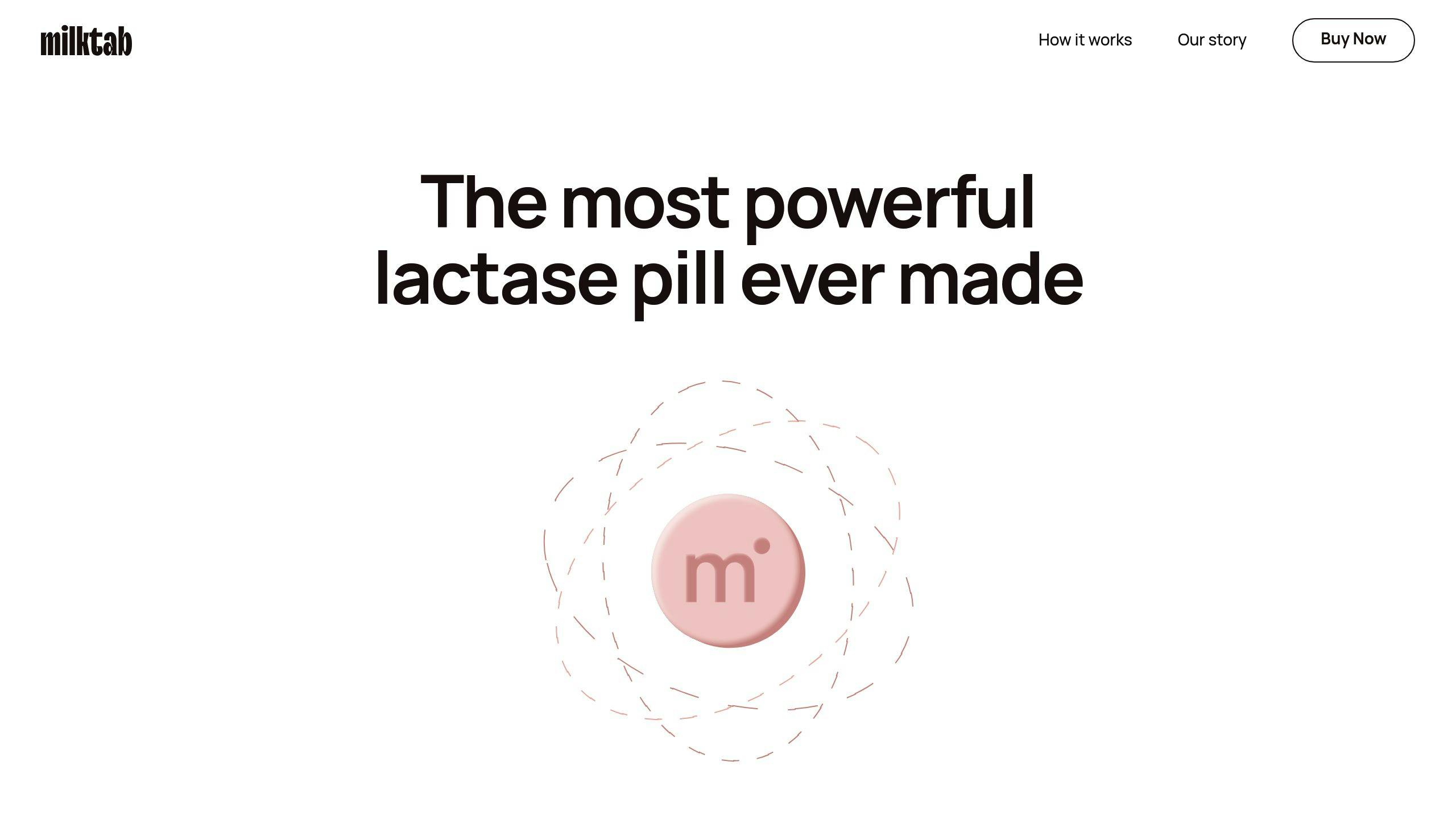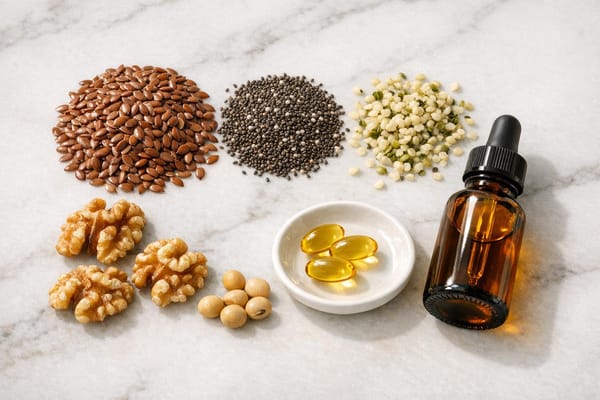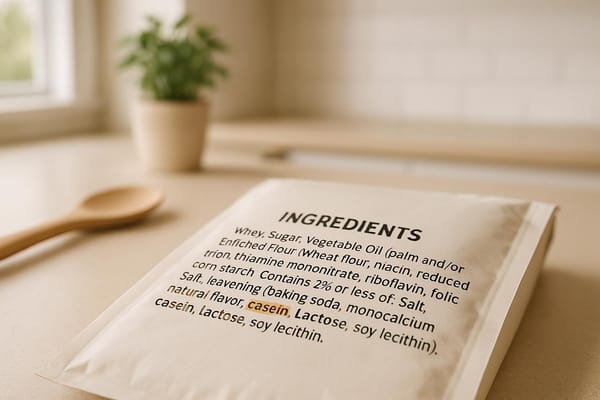5 Signs Your Lactase Pills Aren't Working Effectively
Learn to identify when your lactase pills aren't effectively managing lactose intolerance symptoms and explore potential solutions.

If you rely on lactase pills to enjoy dairy without discomfort, it’s crucial to know when they’re not working as they should. Here are 5 key signs your lactase supplements might be falling short:
- Bloating and Gas: Persistent symptoms after dairy signal incomplete lactose digestion.
- Diarrhea: Watery stools indicate undigested lactose pulling water into your gut.
- Stomach Pain: Cramping or sharp pains suggest fermentation of unprocessed lactose.
- Inconsistent Results: Symptoms vary depending on the dairy product or lactose content.
- No Improvement Over Time: Weeks of use with no relief may mean the pills aren’t effective.
Why This Happens:
- Incorrect timing or dosage.
- Low-quality or weak supplements.
- Overloading on high-lactose foods.
What You Can Do:
- Switch to stronger supplements like milktab with added enzymes for better digestion.
- Choose lactose-free dairy alternatives such as lactose-free milk or yogurt.
- Consult a specialist if symptoms persist despite adjustments.
Taking control of your symptoms starts with recognizing these signs and exploring better solutions.
5 Signs Your Lactase Pills Aren't Working
1. Persistent Bloating and Gas
Taking lactase pills but still feeling bloated or gassy 30 minutes to 2 hours after eating dairy? That’s a red flag. These symptoms suggest your supplements might not be doing their job. Ignoring them can lead to ongoing discomfort and missed chances to explore better options.
2. Diarrhea After Dairy
If you experience diarrhea after consuming dairy, even with lactase pills, it’s a sign the lactose in your food isn’t being fully digested. When this happens, undigested lactose pulls water into your gut, leading to loose stools. Research indicates that only about 22% of people with lactose intolerance get full relief from lactase supplements [1]. Watery stools after dairy could mean your pills aren’t providing enough enzyme support.
3. Stomach Pain After Dairy
Cramps or sharp stomach pain after eating dairy are another clue. These pains happen when undigested lactose ferments in your intestines, producing gas and pressure. If this discomfort continues despite following the pill instructions, it’s time to reassess your strategy.
4. Inconsistent Symptoms with Different Dairy Products
Notice that milk causes bloating, but cheese doesn’t? This could point to inconsistent results from your lactase pills or an issue with dosage. High-lactose foods like milk might overwhelm the pills, while fat in items like ice cream can slow down how the enzyme works.
5. No Progress After Regular Use
Even with weeks of consistent use, if your symptoms haven’t improved, your lactase pills might not be effective. Studies show that about 18% of people don’t respond to these supplements at all [1].
If these signs feel familiar, it’s worth digging deeper into why your lactase pills might not be giving you the relief you’re looking for.
The Top Signs of a Digestive Enzyme Deficiency
Why Lactase Pills Might Not Be Working
If you're still dealing with symptoms, several factors could be affecting how well your lactase pills work. Let’s break down some common reasons.
Timing and Dosage Issues
For the best results, take lactase pills with your first bite of dairy. Taking them too early or after eating dairy can reduce their effectiveness. Also, stick to the recommended dosage - taking too few pills won’t help, and taking extra won’t make a difference either. Keep in mind that the number of pills you need can vary depending on the lactose content of the dairy product you’re eating [1].
Pill Quality and Strength
Not all lactase pills are created equal. The strength and formulation differ between brands, which can impact how well they work. Lower-quality products may not provide the relief you’re looking for, leaving some users frustrated despite following instructions [1].
Overloading on Dairy
Even the strongest pills have their limits. Consuming large amounts of dairy - especially high-lactose foods like milk or ice cream - can overwhelm the supplement. Lactase pills aren’t a free pass for unlimited dairy. Pay attention to your dairy intake and track your symptoms to figure out what works for you [2].
If these factors resonate, it might be worth considering other approaches to manage your symptoms.
What to Do If Lactase Pills Aren't Enough
If lactase pills aren't providing relief, there are other ways to manage your digestive health. Factors like dosage, pill effectiveness, or consuming too much dairy can make these pills less effective. Exploring stronger supplements or adjusting your diet might help ease symptoms.
Consider milktab for a More Effective Solution

milktab offers 27,000 FCC units of lactase along with protease and lipase enzymes. This combination breaks down lactose, proteins, and fats in dairy, providing more thorough digestion. Unlike standard lactase pills that only tackle lactose, milktab’s approach addresses all major dairy components, which can be helpful if regular supplements aren't working for you.
Opt for Lactose-Free Dairy Options
Switching to lactose-free dairy products can significantly reduce symptoms. These alternatives are pre-treated with lactase, making them easier to digest. Some common swaps include:
| Dairy Product | Lactose-Free Alternative |
|---|---|
| Regular Milk | Lactose-free milk |
| Ice Cream | Lactose-free ice cream |
| Yogurt | Lactose-free yogurt (often with added probiotics) |
Consult a Specialist
If symptoms persist, a specialist can help identify other digestive issues and create a tailored plan. Research indicates that only about 22% of people get complete relief from lactase supplements alone [1]. Professional guidance can combine supplements, dietary changes, and medical advice for better results.
A specialist can:
- Determine if other digestive problems are contributing to symptoms
- Develop a customized management plan
- Suggest specific dietary adjustments
As noted by Medical News Today, "Lactase supplements are an addition to dietary management, not a substitute" [3]. Pairing stronger options like milktab with expert advice and dietary changes often delivers the best outcomes.
Take Charge of Your Symptoms
Dealing with lactose intolerance starts with recognizing when your current approach isn’t working. Research shows that only about 22% of people find full relief from standard lactase supplements [1].
Recognizing When to Reassess
If you’re still feeling discomfort even after using lactase pills as directed, it might be time to explore other options. Persistent symptoms often indicate that your current solution isn’t enough.
A Stronger Alternative: milktab

When standard lactase supplements fall short, products like milktab can help. It combines lactase (27,000 FCC), protease (22,000 FCC), and lipase (1,000 FCC) to break down lactose, proteins, and fats. This broader approach targets multiple aspects of dairy digestion.
Seek Professional Guidance
If symptoms continue despite trying stronger supplements, consulting a healthcare provider is crucial. They can rule out other digestive issues and help you create a tailored plan. Often, a mix of better supplements and dietary changes works best [1][3].
Finding the right combination of strategies - whether it’s improved supplements, adjusting your diet, or expert advice - can help you take control of lactose intolerance and improve your quality of life.
FAQs
Why aren't my Lactaid pills working, and how should I take them?

Lactaid pills might not work effectively due to timing mistakes, incorrect dosages, or poor-quality supplements. For instance, taking the pills too early can make them less effective because the enzyme won't be available when lactose enters your digestive system [3]. To get the best results, take the pills with your first bite of dairy, so the enzyme can break down lactose during digestion [3].
Can lactase supplements eliminate all symptoms?
Lactase supplements can help reduce symptoms, but they may not completely eliminate them. Factors such as your personal tolerance levels and other digestive conditions can impact how well they work [1]. Knowing how your body reacts to these supplements can help you manage expectations and symptoms more effectively.
What if I still have symptoms despite taking supplements?
If you're still experiencing symptoms, try these adjustments:
- Timing: Ensure you're taking the supplement with your first bite of dairy.
- Dosage: Talk to your doctor to determine if you need a higher dose.
- Alternative options: Consider switching to a stronger product, like milktab.
- Dairy intake: Reduce portion sizes to make digestion easier.
When should I consult a doctor?
You should see a doctor if:
- Symptoms continue even when using supplements correctly.
- Your symptoms are getting worse over time.
- You're unsure about the right dosage.
- You take medications that could interact with lactase supplements [1][3].



